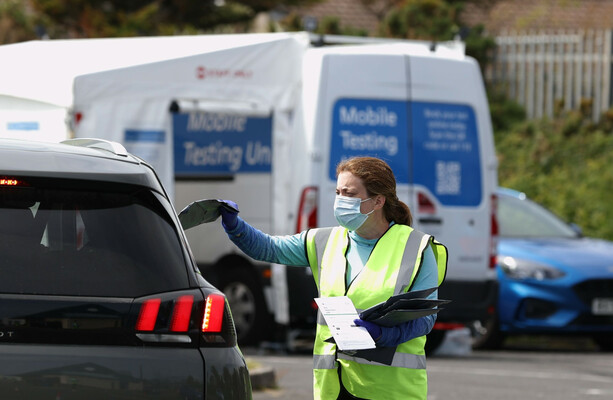The British government has announced that a large-scale UK antibody testing program will be launched for people who have contracted coronavirus.
The programme, which will provide tests to thousands of adults daily, aims to improve understanding and gain « vital » data on antibody protection after infection with Covid and vaccination.
From Tuesday, anyone over 18 from any of the four UK countries can sign up for the program when receiving a PCR test.
Of those who have tested positive for the coronavirus, up to 8,000 finger-prick antibody tests will be sent to complete at home and sent back for analysis.
The first should be taken as soon as possible after a positive result, and the second should be taken after 28 days.
The UK Health Security Agency, which runs the programme, will work alongside NHS testing and tracing services in England, Scotland, Wales and Northern Ireland and use the results to monitor antibody levels in positive cases across the UK.
The UK Department of Health and Social Care says it will be the first time antibody tests have been made available to the general public, and the scheme could also provide insight into any group of people who do not develop an immune response.
The data will be used to guide the ongoing approach to the pandemic and give more insight into the effectiveness of vaccines on new variants.
Health Minister Sajid Javid said the program would build on the « giant defense wall » of the UK’s immunization programme.
« Our new national antibody test will be fast and easy to participate in, » he said.
“By doing so, you will help advance our understanding of Covid-19 as we cautiously return to a more normal life.
« I am proud to see all parts of the UK unite around this new initiative and work together to arm ourselves with even more valuable insights into how Covid-19 vaccines are protecting people across the UK. »
Participants should perform their first antibody test as soon as possible after receiving a positive PCR result so that the body does not have time to generate a detectable antibody response to the infection.
The second test should be done 28 days later and will measure the antibodies produced in response to the infection.
UK Health Security Agency chief executive Dr Jenny Harris said: « We are in the process of conducting antibody testing across the UK to obtain vital data on the impact of our vaccination program and on immune responses to various types of Covid-19.
“This is made possible thanks to the amazing British public who keep coming forward for testing when they show symptoms and the millions of people who have taken their toll.
“The best way to protect yourself and those around you is to get vaccinated.
« I encourage anyone who has not yet applied for a reservation for their first and second packages. »
The announcement comes amid an ongoing debate over the introduction of fortified cookies in the UK.
Dr Chris Smith, consultant virologist and lecturer at the University of Cambridge, UK warned that « don’t worry » about Covid-19 vaccines and that the virus could « come back ».
No news is bad news
magazine support
is yours contributions You’ll help us keep delivering the stories that matter to you
Support us now
Dr Smith said the decision on booster injections should not be « hasty, (or) hasty », and that the government is considering a more « strategic » approach.
Javid said he was « confident » that a booster vaccine campaign could begin next month despite reports that experts want more time to consider whether it is needed.
The government said 104 more people had died within 28 days of testing positive for Covid-19 as of yesterday, and there were a further 32,058 lab-confirmed cases of Covid-19 in the UK.
Speaking on the BBC’s Breakfast programme, Dr Smith said: « We all agree that (the epidemic) is not over until it is over in every corner of the world, otherwise it will come back again.
« But one shouldn’t take one’s eye off the ball here because it would be very easy to unpack all the good work we’ve done so far if it turns out over time that we’re losing immunity because vaccines are dwindling in their efficacy.
« With winter coming, it’s now a critical period and I think that’s why we haven’t seen a hasty, hasty decision by the JCVI (Joint Committee on Vaccination and Immunization) and the government. »
« As other countries embark on reinforcement programmes, people are doing an assessment, they are looking at the data and maybe making a decision on how to strategically intervene in certain groups, » he added.
Research by the National Office of Statistics (ONS) recently found that more than three-quarters of adults in every age group say they would be most likely or very likely to get a booster dose if they were offered one.
Overall, 87% of adults surveyed by the Office for National Statistics said they were likely or very likely to get a third stroke of the coronavirus.
The likelihood increased with age, with 96% of those aged 70 and over indicating their interest, and decreased to 78% from 16 to 29 years old.

















